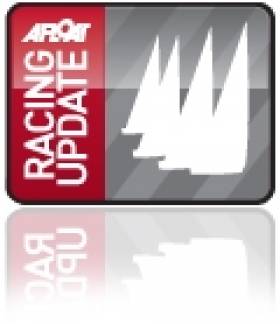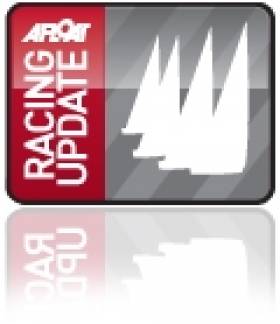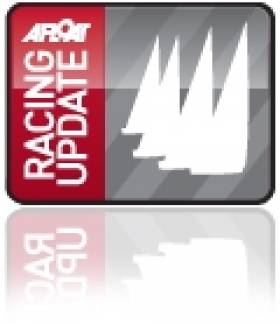Displaying items by tag: West Highland Yachting Week
Northern Ireland boats stamped their mark on the racing in West Highland Yachting Week in Scotland with excellent results, the best of which were Michael Petticrew's Nicholson 43 Magdaleyne from Strangford Lough YC, who took first overall in Class 3 and the Belfast Lough-based White Pearl (D Mitchell), an Elan Impression 434 from Carrickfergus SC on Belfast Lough. And Magdaleyne had the honour of lifting the Peter Cocks Memorial Trophy, which is awarded to the yacht which, in the opinion of the Race Committee, has given the best overall performance throughout the Points Series.
Around 110 boats descended on the waters between Craobh near the western end of the Crinan Canal and raced in the area north of there, taking in Oban and Tobermory, with the option of entering all or some of the outings. Such is the atmosphere surrounding the popular event that others cruised to that stretch to be part of the fun.
 Going to Red, Peter Holden's J109 from East Down YC Photo: Tommy Brown
Going to Red, Peter Holden's J109 from East Down YC Photo: Tommy Brown
Magdaleyne fired the warning signal when she was runner-up in the Gigha to Craobh Feeder race (which doesn’t count in the final placings) and went on in the Series 2023 results to post four firsts and three seconds in the other races. White Pearl also topped Class 2 with a first in the Oban to Tobermory passage race and a second in the Tobermory race, and in runner up slot in that class was Stevie Andrews’ Hanse 371 Dark and Scary (SLYC), counting a win in the Tobermory Race.
 Stevie Andrews’ Hanse 371 Dark and Scary (SLYC), counted a win in the Tobermory Race Photo: Andrew Steenson
Stevie Andrews’ Hanse 371 Dark and Scary (SLYC), counted a win in the Tobermory Race Photo: Andrew Steenson
Other Strangford Lough YC competitors fared well also. Adelante, with the interestingly named Dark and Stormy Syndicate owners of the Elan 37, placed fourth overall in Class 1 with a first in the Oban to Tobermory race.
In Class 7, the Westerly Fulmar Artemis from East Antrim BC (G and H Kane) was 9th overall with a fourth in the Oban to Tobermory race, and in Class 9 from the same club, Gavin Doig’s Hydro 28 Hydrology, 11th.
Northern Ireland Cruiser-Racers are Competing at 75th Anniversary of Scotland's West Highland Yachting Week
Northern Ireland sailors are showcasing their skills at the 75th Anniversary of West Highland Yachting Week in Scotland.
Michael Petticrew's Nicholson 43 Magdaleyne from East Down Yacht Club on Strangford Lough took second place in the Gigha to Craobh Feeder Race, leading the charge of the seven boats from Northern Ireland. Another Strangford Lough boat, the Dark and Stormy Syndicate-owned Elan 37 Adelante came in ninth. Magdaleyne followed up its success in the feeder race with a win in the 12-strong Class 3 in the Craobh race.
 Michael Petticrew's Nicholson 43 Magdaleyne from East Down Yacht Club Photo: Michael Eames
Michael Petticrew's Nicholson 43 Magdaleyne from East Down Yacht Club Photo: Michael Eames
The Sunday races proved fruitful, too, for other Strangford Lough boats. In Class 1, Peter Holden’s J109 Going to Red from Strangford Lough YC was fourth, and Adelante was fifth.
 The Elan 37 Adelante from Strangford Lough Photo: Tommy Brown
The Elan 37 Adelante from Strangford Lough Photo: Tommy Brown
In Class 2, first place went to the Belfast Lough-based White Pearl (D Mitchell), an Elan Impression 434 White Pearl from Carrickfergus SC, and yet another SLYC entrant, Stevie Andrews in the Hanse 371 Dark and Scary was runner up.

From Larne Lough in Co Antrim the Westerly Fulmar, the East Antrim BC Artemis (G and H Kane) was 10th in Class 7, and from the same club, Gavin Doig’s Hydro 28 Hydrology was 11th in Class 9.
The West Highland Yachting Week started on July 29 and runs until August 4.
The week features optional races with feeder races from the island of Gigha and passage races starting on July 31.
2023 West Highland Yachting Week Results are here
Two more Northern Ireland yachts have joined the 50-strong fleet for Scotland's West Highland Yachting Week, which celebrates 75 years in 2023 and runs from 29th July till 4th August.
East Antrim Boat Club's Hydrology and Artemis from Larne Lough join Temptress of Down from Royal Ulster on Belfast Lough. All have entered in time to avail of the Early Bird discount, which ends on 31st March.
Gordon Kane, a former Commodore at East Antrim, has entered his Westerly Fulmar 32 Artemis and on board will be his wife Heather and daughter Katie, who is making the trip from Bristol to join the boat. A friend will make up the four-strong crew on their first time at West Highland Week.
Katie has plenty of dinghy racing experience, having sailed Toppers, Lasers and 420s and was on the RYA NI squad. She has also been a Sailing Instructor at East Antrim, BC.
 Richard Doig's 29-foot Hydro 28
Richard Doig's 29-foot Hydro 28
Also from East Antrim BC will be long-time member Richard Doig, who was given in 2008 an RYA Community Award for Lifetime Commitment. Racing his 29-foot Hydro 28, modified with a sugar scoop, Richard will have four or five crew. He is also competing in the Scottish Series at the end of May, and among his crew will be Gordon Kane, a regular crew in Richard's previous boat, a GK 24.
Belfast Lough Successes at West Highland Yachting Week
Three Belfast Lough yachts had great results at West Highland Week, which ended on Friday last, two from Carrickfergus Sailing Club on the north shore and another from Royal Ulster Yacht Club on the opposite side.
The best result came from Gareth Martel’s First 40.7 from Royal Ulster who, after a ninth in the 20-strong feeder race fleet from Oban, was first in Class 2, counting three wins, the Croabh 1 race, Lynn of Lorne race and the Oban to Tobermory passage race. Another trophy to add to Pippa’s Ailsa Craig offshore race prize earlier in the season.
 Gareth Martel’s First 40.7 from Royal Ulster
Gareth Martel’s First 40.7 from Royal Ulster
From Carrickfergus in Class One, Bruce Douglas’s J133 Spirit of Jacana was third overall of 13 starters, counting second places in Croabh races 1 and 2 and in the Sound of Mull race. Also from CSC White Pearl, an Elan Impression 434 (D Mitchell) raced in the ten-strong Class 2 and finished fifth, with second in the Lynn of Lorne Race 1 as her best result.
 White Pearl, an Elan Impression 434 (D Mitchell) Photo: via CSC Facebook
White Pearl, an Elan Impression 434 (D Mitchell) Photo: via CSC Facebook
West Highland Yachting Week (WHYW) Moves to Avoid Commonwealth Clash
#whyw – Scotland's largest yachting event, West Highland Yachting Week (WHYW) will next year take place from July 12 to July 18 2014, two weeks earlier than usual. This is to avoid a clash with the Commonwealth Games being hosted in Glasgow from July 23 to August 3 2014.
David Waltho, chairman of the Joint Regatta Committee (JRC) that organises WHYW explained the decision to move the event dates forward : 'We are now Scotland's largest yachting regatta. We don't in any way want to clash with such an important event as the Commonwealth Games being held in Glasgow for the first time. The whole nation will be caught up in this major event.
We feel that many of our competitors will certainly wish to attend some part of the Games and moving WHYW from its usual slot at the end of July will enable them to do this and still enjoy all the traditional wonderful racing that WHYW has to offer.'
West Highland Yachting Week provides a spectacle of sail on the west coast of Scotland based around Craobh Marina, Oban and Tobermory giving a mix of passage racing and Olympic courses over six days for ten yacht classes. For more check out the website on www.whyw.co.uk
West Highland Yachting Week Continues in Light Winds
#westhighlandracing – Light overall conditions on Tuesday saw the West Highland Yachting yachts split into the Tunnock's Fleet for round the buoys racing whilst the restricted sail class Argyll Fleet sailed a short inshore race to the south in the Firth of Lorne. With light conditions overall only one windward leeward race was managed for the Tunnock's Fleet with the wind dying to nothing in the afternoon.
Another win for Anderson and Findlay's XP38i Roxstar puts them on a class lead in IRC 0. Alan Jeffrey and Paul Scutt in Carmen II took second with Geoff Bowerman's J109 third.
In Class 1 Harvey MacLachlan's Dehler 36 Polaris took the bullet with Iain Laidlaw having to be content with second again in his J97 Jaywalker. Richard Shellcock's Delphia Racer Knuts revelled in the light conditions to take the win from Ken Andrew's Sunshine 38 Argento in Class 3 with the Sigma 33 Leaky Roof II winning Class 5. With seven Sigmas and all other boats racing off the same handicap this is effectively one-design racing in Class 5. Simon Grey's Sigma 33 Carmen finished second with Eric Chapman's Amber Haze third.
White sail family boat Sunrise won Class 2 with Scott Chalmers and Janet Morrison's First 33.7 Bragar was first in Class 4 of the Argyll Fleet. In Class 6 Donald McLaren's Sigmatic took another first with Judy Orr and her MGC 27 team in Eureka winning Class 9.
The Contessa 25 of the Fyfe family sprinted away from all the other Class 8 boats to take a convincing win by nearly four minutes on corrected time from Port Edgar boat Cherry Pye helmed by Chris Hall.
Wednesday's race to Tobermory for the fleet looks to be breezy and wet, a complete contrast to Tuesday's racing.
West Highland Yachting Week receives sponsorship support from Tunnock's, The Oban Common Good Fund, Argyll and Bute Council, Tobermory Whisky, Tobermory Harbour Association, Caledonian MacBrayne, Scottish Fuels and the Crown Estate with help in kind from Flit Self Drive and West Coast Motors.
Full Results on the website.
Results
Class 0 1 Roxstar 2 Carmen II 3 3 No Worries
Class 1 1 Polaris 2 Jaywalker 3 More Misjif
Class 2 1 Sunrise 2 Texa 3 Lorca J
Class 3 1 Knuts 2 Argento 3 Stoirm Mhor
Class 4 1 Bragar 2 Hoodlum 3 Mystic Sun
Class 5 1 Leaky Roof II 2 Carmen 3 Amber Haze
Class 6 1 Sigmatic 2 Slippi Jin 3 Glenafton
Class 7 1 Revelry 2 Stargazer 3 Mahuri
Class 8 1 Popcorn 2 Cherry Pye 3 Hot Toddy
Class 9 1 Eureka 2 Smithereen 3 Malindi of Lorn
The Regatta's ethos is a mix of top quality racing for the spinnaker fleet with restricted sail classes (non-spinnaker racing) allowing a range of family participation. The après sail social scene includes family swimming,, touch rugby and a skipper's reception. Each night there is a headline event for competitors and the final prize-giving on Friday evening August 3 is followed by a Scottish ceilidh.
West Highland Yachting Week Gets off to Classy Start
#westhighlandweek – Fickle winds made for testing sailing conditions for the 114-strong fleet of West Highland Yachting Week that set off from Craobh marina on Sunday July 29 2012 racing to Oban.
From an initially steady north-west wind making for a good beat and fetch to the Sound of Luing the wind died and backed to the south off Easdale and kites were set for the finish line in the Sound of Kerrera. It was a mixed bag of tactics with the wind going light in the centre of the run in and some boats winning out by sailing the longer distance round the outside of the fleet.
It had been a similar story for the feeder race from Oban to Craobh. After a promising start with close beating down the Sound of Kerrera, the 'stop start' conditions made for frustrating racing. However Terry Kirchin's First 40 The Black Prince from Port Edgar stayed on the breeze to the shortened finish line off Luing with Hot Toddy taking second and David Cooper's Trapper 28 Redwing third. The feeder from Gigha was won by Lizante, James Regan's Jeaneau 42i, with the Irish First 35s5 Slippi Jin of Jim Shields second and Mike Spence's A35 Le Basculer third.
Making a first appearance at WHYW is Jim McIlraith's head-turning yawl Saboo who lifted not only the win in Class 7 but the Oban Bicentenary Trophy for the best corrected time overall in this race sponsored by Caledonian MacBrayne. Jim normally heads to the Festival of Sail in Brest but this year the timing and option to sail with the family at WHYW proved the magnet of attraction.
And in Class 8 it was a fitting return to the racing scene for Lochaber sailor Ian Fyfe and Popcorn. After 30 years, 26 of which she was laid up ashore, this Contessa 25 has returned to West Highland Yachting Week and showed she has lost none of her winning form lifting the Class 8 silverware by 15 seconds from Roxy Robson's Contessa 26 Windflower. The Class 0 fleet was won by John Stamp's new J111 Jacob V who finished the 17-mile race in two and a half hours also lifting the MacBrayne Centenary Challenge Cup for the fastest passage in the fleet. Iain Laidlaw's J97 won Class 1.
West Highland Yachting Week receives sponsorship support from Tunnock's, The Oban Common Good Fund, Argyll and Bute Council, Tobermory Whisky, Tobermory Harbour Association, Caledonian MacBrayne, Scottish Fuels and the Crown Estate with help in kind from Flit Self Drive and West Coast Motors.
Results
Class 0 1 Jacob V John Stamp, 2 Carmen II Jeffrey/Scutt 3 No Worries Geoff Bowerman
Class 1 1 Jaywalker Iain Laidlaw 2 Ajax Anne Campbell 3 Lucky Ned Pepper Graham Anderson
Class 2 1 Farahbout Alan Petrie 2 Texa John Watson 3 Sunrise Scott Chalmers
Class 3 1 Hendrick's Lindsay Doig 2 Spirit Alistair Manderson 3 Amaryllis Wilson Malone
Class 4 1 Leomaris of Clyde Ricky Gray 2 Hoodlum Robin Ferguson 3 Mystic Sun Williams/Johnson
Class 5 1 Leaky Roof II Alan Harper 2 Tangle o'the Isles Joey Gough 3 Strike 3 Mark Taylor
Class 6 1 Glenafton Brian Young 2 Sigmatic Donald McLaren 3 Valhalla of Ashton Alan Dunnett
Class 7 1 Saboo Jim McIlraith 2 Piecemaker Stuart Hamilton 3 Cool Bandit 2 Craig Anderson
































































